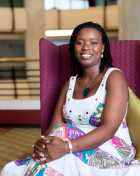I live in Johannesburg, South Africa, while I work internationally in Africa, Asia and Latin America. I coordinate a global project on violence against women and information and communications technologies. This involves managing research, policy advocacy, training and capacity building and providing guidance and supervision to country coordinators. I also train women and communities in the strategic use of ICTs for social justice with a focus on digital storytelling.
I call myself a feminist because I see unequal power relations that are supported and reinforced by the system of patriarchy as the root of women’s oppression. I believe that the struggle for the actualisation of women’s rights is personal and political and that it must be fought in private and public spaces. My politics and practice is built on the values of inclusion, participation, acknowledgement of privilege and embracing and celebrating difference of age, location, sexual orientation, class and ability.
Some of the greatest challenges faced by feminists in Africa today include the collusion between religious fundamentalisms, states and patriarchy that has caused a backlash against feminism and a steady rolling back of the gains that have been achieved. We are also in a moment when the critical spaces for feminist reflection, collaboration and action also seem to be diminishing. Added to this is the fact that a donor development agenda that supports a particular kind of ‘gender work’ means that much of the social justice work does not fundamentally challenge gender hierarchies, and sometimes reinforces them.
To shift this, we need to get better at sharing and distributing the rich body of scholarly work that is being produced by African feminists. We also need to support and initiate inter-generational feminist processes and ensure that the stories and experiences of African feminists and our struggles are told unscripted, in many languages, by many diverse feminists and shared and popularised throughout the continent – not only in print form, but capitalising on huge potential that ICTs hold. I love the individual ethics section of the Feminist Charter because it really resonates with my personal values and articulates them so clearly and strongly. It would be great to see the Charter come to ‘life’ so to speak by seeing what these ethics mean in practice through the voices and experiences of those who subscribe to these values, so use the Charter to frame the stories referred to earlier.
In my own life, I make every effort to work with and connect to other African feminists in my work and personal life and to reflect on and share our struggles, victories and share strategies for change. I deeply committed in ensuring that more women’s rights activists are able to use ICTs strategically in their advocacy and participate in internet governance spaces where decisions around censorship, definitions of harm, and internet rights are being dominated by groups who do not necessarily have a women’s rights framing. I am personally inspired by moments of connection with women who I never met, but with who I share a bond through our common desire for change, as well as by the transformative creativity of African writers, artists and poets.



